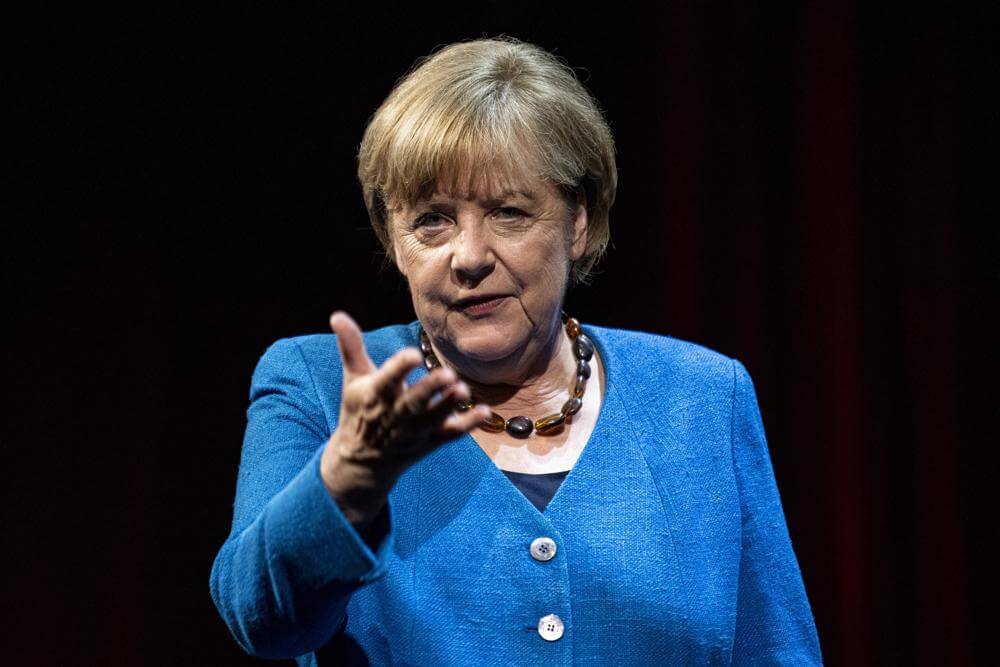On Tuesday, in her first interview since leaving office in December, former German Chancellor Angela Merkel defended her policies on Russian President Vladimir Putin during her 16-year rule, claiming that she doesn’t “blame” herself for not being able to prevent Russia’s invasion of Ukraine.
“I have tried to work in the direction of preventing mischief. It is a great sadness that I did not succeed. And if diplomacy doesn’t succeed, this doesn’t mean that it was therefore wrong… And therefore, I won’t apologise,” she told a packed audience at the Berliner Ensemble theatre in Berlin.
Merkel was asked about her own decisions vis a vis Russia and Ukraine, she didn’t apologize for Nordstream or objecting to Kyiv’s admission to NATO.
— Joyce Karam (@Joyce_Karam) June 7, 2022
But she was clear that circumstances have changed now, that Nordstream2 is over and Ukraine 2008 is different from today.
Merkel denounced Russia’s “brutal assault in defiance of international law for which there is no excuse whatsoever” as a “great mistake.” “If we started to go through one century after another arguing which territory belongs to whom, then we would be at war non-stop,” she added.
Additionally, the former leader of the conservative Christian Democratic Union (CDU) admitted that she had failed “to create a security architecture that could have prevented this [Ukraine war].”
Merkel said she would have felt “very bad” if she resigned herself to thinking “there’s no point talking to that man [Putin].” She remarked that she left no stone unturned in trying to avoid the current war. Merkel recalled, however, that during the G20 summit in Rome last October, she understood that Putin was “finished” with the 2015 Minsk Agreement, negotiated by her and then-French President Francois Hollande, between Russia and Ukraine after Moscow annexed Crimea. The agreement was an effort to bring about peace in the Donbas region of eastern Ukraine, where Russia-backed separatists were in an armed conflict with Ukrainian forces.
Ahead of summit, Merkel’s government signaled it would veto a US push to ok MAPs for Ukraine + Georgia. (NATO allies can veto new members — as Turkey's Erdogan has reminded us of late, re Sweden and Finland's NATO bids.) Why'd Merkel do it? 3/https://t.co/SnVtlvLFn2
— Zoya Sheftalovich (@zoyashef) June 8, 2022
Merkel opined that though it was not favourable to Ukraine, “Putin could have caused huge damage in Ukraine in 2014. At the time, it brought calm and gave Ukraine, for example, a lot of time, seven years, to develop into what it is today.”
“It was not the Ukraine that we know from today. It was a Ukraine that was very, very divided politically,” she noted, adding that it was “ruled by oligarchs” and suffered from deep-rooted systemic corruption.
The former chancellor acknowledged that severe sanctions were not imposed against Russia after it annexed Crimea in 2014, because the majority weren’t very interested. However, she said that it led to Russia being removed from the G8, and also resulted in NATO countries having to spend 2% of their GDP on their military. “It [the military] is the only language that Putin understands. He saw that we, and not just Germany but others too, no longer had the strike power of the Cold War,” Merkel disclosed.
After the discovery of the Bucha massacre, Ukrainian President Volodymyr Zelensky had condemned Merkel and former French President Nicholas Sarkozy for opposing Ukraine’s North Atlantic Treaty Organization’s (NATO) membership.
“You cannot become a member of NATO from one day to the next. It’s a process, and during this process, I knew Putin would have done something to Ukraine that would not have been good for it,” Merkel responded, adding, “I was very sure that Putin is not going to just let that happen. From his perspective, that would be a declaration of war.” The ex-leader assessed that Russia’s invasion “would have happened even faster” had Ukraine been given NATO membership.
She says she never believed in Wandel durch Handel. She didn‘t think Putin would change through trade, but if political cooperation was impossible, at least having certain trade connections seemed sensible. Her main point: Russia is there, you can‘t just ignore it.
— Helene von Bismarck (@HeleneBismarck) June 7, 2022
Merkel further asserted that she was not “naïve” to believe that Germany’s Wandel durch Handel (change through trade) policy would work on Putin. She recalled that during a 2007 meeting in Sochi, Putin told her that the disintegration of the Soviet Union was “the worst event of the 20th century,” to which Merkel responded by saying that it meant living her life in freedom.
She disclosed that Putin “hated” democracy and wanted to “destroy the European Union (EU) because he sees it as a precursor to NATO.” Nevertheless, she decided to pursue “some trade relations” with Russia, such as the controversial Nord Stream 2 underwater pipeline to supply Russian natural gas directly to Germany.
In her first interview since leaving office, former German chancellor Angela Merkel has defended her policy toward Russia and said she doesn't blame herself for the current situation in Ukraine.
— Thomas Sparrow (@Thomas_Sparrow) June 8, 2022
"Diplomacy isn't wrong just because it hasn't worked" pic.twitter.com/yCY1SXm5s9
The $11 billion pipeline would have increased the EU’s dependency on Russian energy, which was severely opposed by the United States (US). Merkel’s successor Olaf Scholz, however, put the project on hold indefinitely in February, right before the Ukraine war began. “You cannot ignore each other completely. We have to find a way to co-exist despite all our differences,” Merkel remarked.
Another point of difference between Merkel and Scholz is the current government’s decision to supply arms to Ukraine. “That is no longer on the agenda today—this is a different time,” she said.

